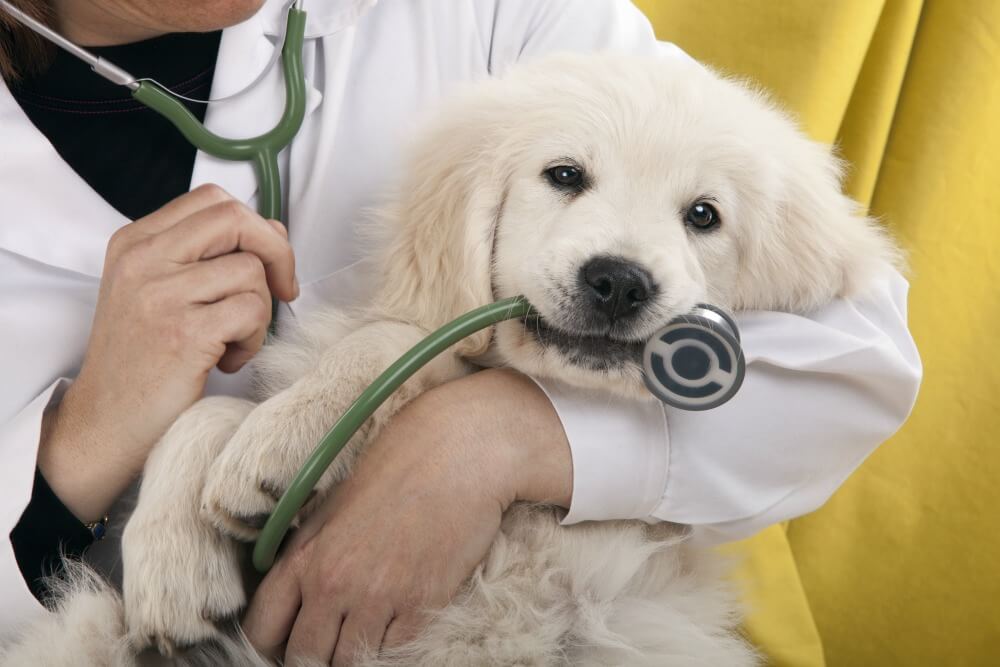The Most Common Puppy Health Problems

Bringing a new puppy home is lots of fun, but will also mean responsibility. Caring for your new furry best friend means taking into consideration regular veterinary care, and ensuring that your puppy grows into a happy and healthy adult dog.
Before bringing your puppy home, you'll need to locate a veterinarian that is close to your home. You'll also need to decide whether you're going to opt for traditional veterinary care or holistic. Scheduling regular vaccination visits is critical to having a healthy puppy.
Giardia
Your pup can develop giardia by drinking contaminated water that contains infectious cysts. This parasitic infection is caused by the Giardia species of protozoan. Younger dogs will be more likely to have symptoms.
Your veterinarian will do a fecal exam to check for the organisms. If the results show three negative fecal tests spaced two days apart, then giardia can be ruled out. Symptoms include foul smelling diarrhea. Your vet may use drugs to treat Giardia, though vaccines are available to prevent it.
Tapeworms
For your pup to be infected with tapeworms, he must have ingested a flea carrying the eggs of a tapeworm. Treatment requires preventatives and a dewormer. There are also several prescription drugs that your vet may recommend. Signs of infection include failure to digest and absorb food normally, mild diarrhea, colic, and malaise.
Distemper
This is caused by a virus, and is very contagious. Today, it's still a leading cause of death around the world for unvaccinated pets. Vaccinations are important to prevent distemper. Signs of distemper include a watery discharge from the eyes and nose, with the discharge becoming really thick and yellow after a few days. There is also vomiting, diarrhea and a cough. With advanced cases of distemper, seizures and muscle spasms are apparent.
Kennel Cough
Kennel cough is a highly contagious respiratory disease that can be prevented with vaccinations. The cough related to kennel cough is a dry and harsh cough that may continue for several weeks. Without veterinary treatment, secondary bacterial infections may take place.
Veterinarians will usually prescribe antibiotics, and suggest that the dog recover in a warm, well-ventilated room that is isolated from other dogs and pets. Canine cough-suppressant may also be effective in reducing the cough.
Heart Disease
Heart disease in dogs may be hereditary, when it's diagnosed after birth, and treated with medication. Cardiovascular disease may not go away, and can become more serious with time. Heart disease in dogs may also be more difficult to detect, and be present without ever resulting in heart failure. That said, a canine rehabilitation specialist may be needed in severe cases.
Parvovirus
Parvovirus can be deadly, thus the need for vaccinations. Puppies are vulnerable to parvo, and will need intensive veterinary care and hospitalization if they are infected. Symptoms include bloody diarrhea, anorexia, fever, vomiting and extreme weight loss.
With the intestinal form of parvo, the puppy will become dehydrated and weak since it affects the body's ability to absorb nutrients. The infected puppy may also have a distended stomach with pain. Since this is a viral infection, your veterinarian will recommend intravenous fluid and nutrition therapy.
Diarrhea and Vomiting
This seems to be common in pups and adult dogs, and may be present with just vomiting or diarrhea. Both can be caused by numerous things like a change of diet, eating old food, medical conditions, and or infectious agents.
That said, taking your puppy or adult dog to the veterinarian if your dog is lethargic, has a lack of appetite, and if the diarrhea has not ceased after a day. If your dog is retching, but not throwing up, it could be a medical emergency. Bland and easily digestible diets are most recommended, and your veterinarian may prescribe medications for this.
Obesity
Keeping your puppy healthy and fit is key to preventing mobility and health issues related to obesity. Senior dogs will need less calories than younger dogs. Puppies that don't get enough exercise on a regular schedule will gain weight, and also be prone to behavioral problems.
A high-quality diet for the right life stage is important. Overfeeding should be avoided to prevent heart disease and arthritis. Consult with your veterinarian for advice as to the right diet and amount of food needed to maintain a healthy weight. Fresh, clean water needs to be available 24/7.
Hip Dysplasia
This is a common developmental disorder that involves the hip joints. Many large dog breeds may be predisposed to hip dysplasia. Signs include lameness, and treatments will range from weight loss programs to joint fusion surgery, depending on the severity of the joint disease. Hip dysplasia may be treated with non-steroidal, anti-inflammatory drugs for pain relief.
Corticosteroids are also prescribed to combat inflammation. Exercise should take place on soft surfaces, and young dogs should never be exercised excessively on hard surfaces. Joint-fluid modifiers can also help prevent increased cartilage degradation.
Puppies and dogs are highly social animals that need to be around people and other animals. Although it's not always easy to see whether you have an emergency that needs prompt veterinary attention, always consult with your veterinarian when symptoms include gastrointestinal issues like vomiting and diarrhea, urinary issues, eye problems, injuries, weight loss, heart and breathing issues, and also lumps, bumps and itching.
That said, follow your puppy vaccination schedule to prevent your puppy from getting ill. All puppies need to be protected from common infectious diseases that can be deadly.
839GYLCCC1992



Leave a Reply